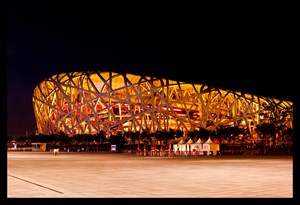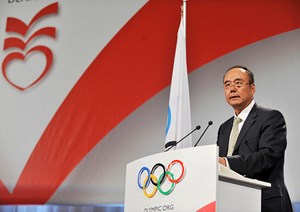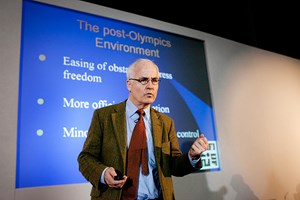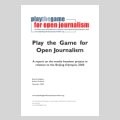The Beijing Olympics
The Olympic Games in Beijing 2008 is one of the clearest examples that many people consider sport, politics and the media to be intimately linked despite protests from the International Olympic Committee and other sports movements that they have little responsibility for promoting certain political or social developments in host countries for mega-events.
In the run up to the Beijing Olympics, Play the Game is following some key aspects of the Games as well as furthering the public debate over the significance of the event in sporting, cultural, economic and political terms.
News on the Beijing Olympics
-
New in Knowledge Bank: The greatest mega-event of all time
26.01.2011
-
Olympic legacy in the eyes of a 30-year old local
07.10.2009 -
“Awarding Beijing the 2008 Olympics was the right choice,” concludes IOC evaluation committee
07.10.2009
-
No clear victory as China set out to improve image through Beijing 2008 Olympics
09.06.2009
-
Beijing must Open Door to Media Freedom, says report on Olympics
27.11.2008
Play the Game for open journalism
In the run up of the 2008 Beijing Olympics, Play the Game created a sub-site to assist and inform journalists covering the Games.
The 2008 Beijing Olympics was a significant event in the relationship between China and the media. For the first time in recent history, foreign journalists have been granted the right to work freely without interference from Chinese authorities. These regulations, initially in place for just the Olympic reporting period have now been extended indefinitely.
This theme page has been created by Play the Game for Open Journalism in order to assist journalists painting a full, fair and accurate picture of China during this window of opportunity for reporters and to help reporters tell their stories.
The Play the Game for open journalism site contains information on:
The project is a joint initiative of the International Federation of Journalists, the world's largest association of journalists, and Play the Game, a non-profit organisation working to strengthen the basic ethical values of sport and encourage democracy, transparency and freedom of expression in world sport.
The 2008 Beijing Olympics main themes
Click on the links in the menu to find introductions to these themes with articles and news from Play the Game and links to relevant information elsewhere.
The olympics in China - the price of the medal
Already, the forthcoming Olympic Games have become a media event without parallel, though probably not in the way the organisers had envisaged. Across the world, a discussion is now rolling on the relationship between sport and politics, between China and the West, and between gala ceremonies and human rights. To qualify the public debate with facts and improve the understanding of the different interests involved, Play the Game is hosting the seminar The Olympics in China: The Price of the Medal.
The seminar has been made in collaboration with the Danish Institute for Sports Studies and UPDATE, The Danish Journalism Development Institute.
Humanistic Olympics
The Chinese approach to the Olympic games is embodied in the concept 'Humanistic Olympics' - renwen aoyun - which may change how we think about the Olympics in the future. But what does it mean and does it relate to human rights at all?
The Olympics and human rights in China
When the IOC awarded the Olympic Games to China, it took a bet that human rights conditions in the country would improve. Do the Olympic Games or the International Olympic Committee have the ability to be a catalyst for human rights reforms in China, or are Chinese and Western conceptions of human rights so different to be incompatible?
Journalism and the Beijing Olympics
As one of their pledges to the International Olympic Committee, the Chinese authorities pledged free and open access to foreign media during the course of the Olympic Games. Have the Chinese lived up to this promise, or do too many hurdles lie in the way for reporters? What is the situation for Chinese journalists, and how have the Games affected journalistic practices in the host country?





